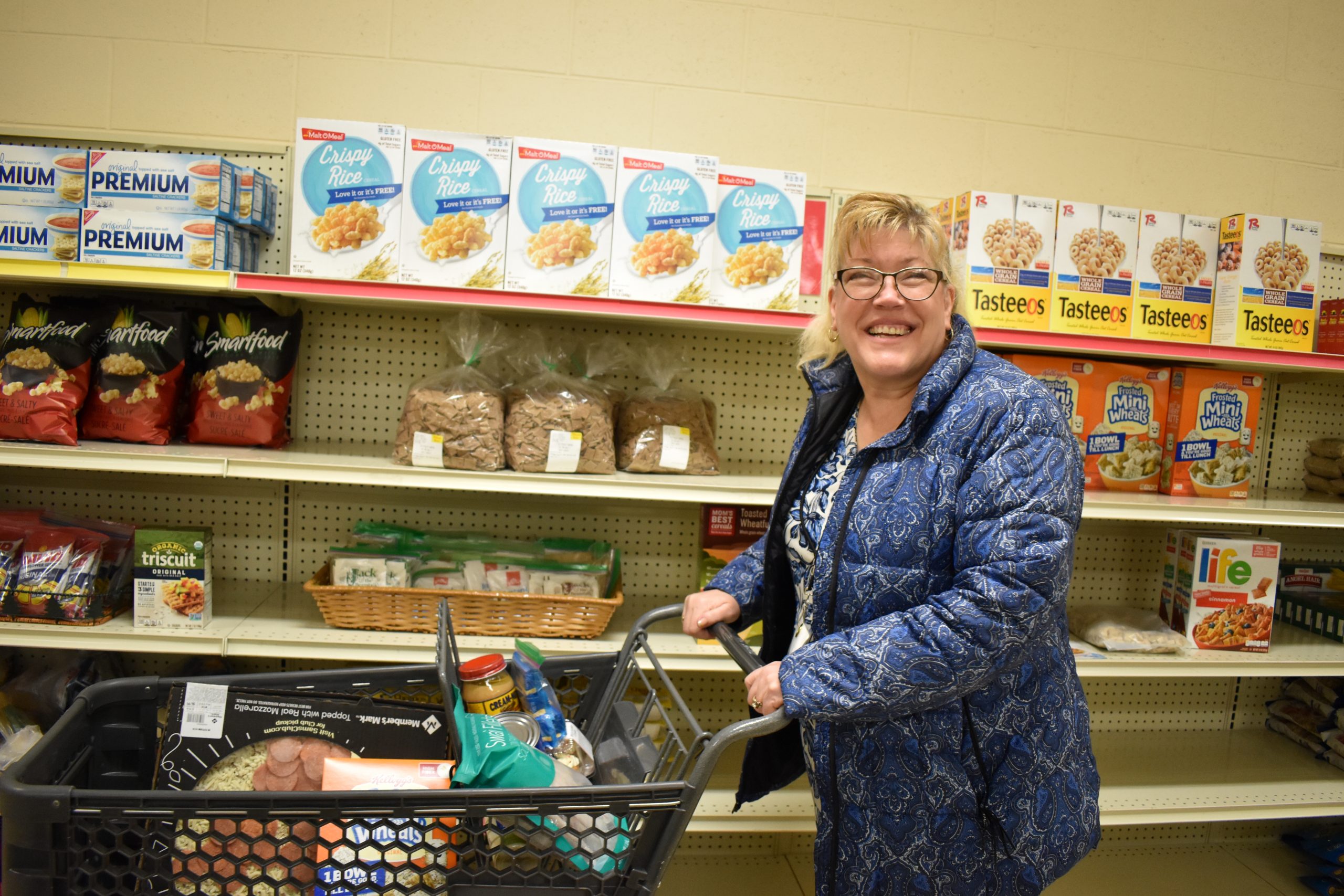If you visited St. Alphonsus Food & Clothing Center in its early days more than 40 years ago, you would likely see Sister Roberta, the food pantry’s founder, arriving with a semi-truck full of food from a run to Feeding America West Michigan. Sister Roberta has since passed away, but her fiery spirit and passion for ending hunger lives on in director of social concerns, Michelle, and pantry coordinator, Mary Beth, who run “St. Al’s” with the help of 20+ dedicated volunteers.

Although the center has made many locations home over the years, Michelle and Mary Beth’s favorite is their current location, in the parish’s old elementary school. They love how it provides barrier-free access and enables neighbors to shop the clothing and pantry sections as if they were in a grocery store or boutique. In the past, their buildings were so small that neighbors had to check what they would like off a list for volunteers to find.
Structured much like a grocery store with refrigerators, freezers, home cleaning and personal care sections, the pantry is color-coded with charts identifying how many items a client may take from each section, based on family size. They even offer pet food and diapers thanks to partnerships with the Humane Society and Great Star Collaborative.

The food and clothing center serves neighbors living on the Northeast side of Grand Rapids.
“If they’re here and they’re in need, we’re helping them,” said Michelle.
The center doesn’t limit its offerings to tangible items. Beyond supplying neighbors with necessities, the center also offers free classes for anyone in the community. This year, they held a diabetes class.
“It’s always been my goal to help see people successful,” Michelle said. “Not only through food, but programming that can help educate people to make better life choices or just be better overall.”
Another way the center assists its neighbors is through a partnership with the Calvin University nursing program. Each Wednesday (before COVID-19), nursing students created an easy-to-prepare, healthy recipe that they could demo in the pantry’s entryway – using items found at the pantry. Neighbors could then receive samples and copies of the recipe.

“They’re trying to find things in our pantry that people can go to and be like, ‘oh, I really like this item and I didn’t know,’” Michelle said.
She started the partnership after realizing certain foods lingered on the shelves because clients didn’t know they liked them or how to cook with them. By tasting sample recipes made from these items, and being able to bring the recipe home, the “strange” foods became more accessible.
“We are trying to find unique ways to be innovative,” Michelle said.
To stock their shelves, St. Al’s relies largely on Feeding America West Michigan. At least 80 percent of their food comes from the food bank. They particularly love being able to fill their freezers and refrigerators with fresh produce and protein after a trip to the food bank.
“It helps us serve so many more people than us having to pay full price at the grocery store,” Michelle said.
The neighbors St. Al’s serves are appreciative of the pantry’s set-up as well. The center works hard to make them feel as if they’re visiting an actual grocery store.
One neighbor, Deb, said she always feels welcome at the pantry. Shopping there brings her a sense of “dignity.”
Deb is a leather artist who owns her own business. 25 years ago, when her children were young and her husband was working full-time, she volunteered at food pantries herself. Then, her teenage daughter became addicted to heroin and her family’s whole world changed.
As her daughter grew older, she had children of her own but remained an addict. Eventually, Deb explained, her daughter “gave up on everybody and everything,” and her twin sons were left behind for Deb and her husband to care for. They adopted the boys, one with cerebral palsy and the other with PTSD.
Deb’s husband lost his job due to physical challenges just weeks after the adoption went through, and Deb returned to her business. She is trying to build up her client base so that she can work full-time, all while caring for her grandsons – who are now 12 years old and doing great. Being able to receive food and clothes from St. Al’s helps her family make ends meet.

“We came out of the horrible storm. We learned to downsize. We learned to do it all,” Deb said. “Less is best. Be thankful for what you have – that’s my whole mentality.”
Story written by Communication Assistant Juliana Ludema.
Video created by Videography Intern Kyle Macciomei.

